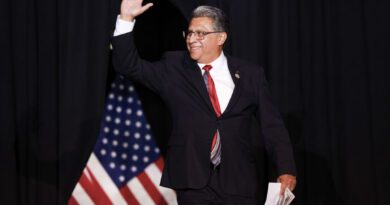US News: Uncovering the Controversial Plans of Project 2025 Linked to Donald Trump’s Presidency
As Donald Trump readies his return to the White House, focus has shifted back to Project 2025 – a contentious plan for government linked to the president-elect.
The 922-page blueprint for government has the potential to reshape American democracy, according to reports.
Authored by the influential conservative think tank, the Heritage Foundation, the document lays out policy proposals for a Republican victory in the US presidential election, which was secured when Mr. Trump won Wisconsin yesterday morning, surpassing the 270 electoral college votes needed for success.
What policies are outlined in the document?
The document suggests a four-pillar approach – the first pillar includes policy enactments, while the other pillars outline how these policies will be implemented.
This involves creating a roster of individuals willing to relocate to Washington to establish “an army of aligned, vetted, trained, and prepared conservatives to get to work on Day One to dismantle the Administrative State”.
Central to the plan is the aim to “restore the family” as the focal point of US life, advocating that once a conservative president is inaugurated, “Federal power must… be used to reverse the crisis and save America’s children from familial breakdown.”
The policy agenda encompasses criminalizing pornography, dismantling the departments for education and homeland security, and revamping the FBI.
It rejects the notion of abortion as healthcare, proposes the reduction of LGBTQ+ rights, discontinues climate projections, and suggests employing the military to address large-scale protests.
Regarding immigration, the plan calls for the largest deportation in history, a policy that Donald Trump has also voiced support for.
The database of personnel willing to contribute to Project 25 would establish a pool of politically appointed civil servants, who would receive training through an online presidential academy.
A 180-day action plan detailing how the government would achieve its objectives constitutes the fourth pillar of the project.
👉Listen to The World with Richard Engle and Yalda Hakim on your podcast app👈
Who is the Heritage Foundation?
The Heritage Foundation, headquartered in Washington DC, was established in 1973.
At its inception, the foundation’s mission was to shape America into a more Christian, conservative nation.
“Essentially, this boils down to a vision of the country that favors and prioritizes Christians,” noted US historian Dr. Kristin Kobes Du Mez.
In 1981, the foundation released its first manifesto, pledging to reduce the state and unleash free-market capitalism, coinciding with Ronald Reagan’s inauguration as president in January of that year.
One of the authors of the report states in the introduction: “By the end of that year, over 60% of its recommendations had been implemented.”
What are Trump’s remarks on the document?
While Donald Trump attempted to distance himself from Project 2025 during the election campaign, the president-elect had previously spoken at Heritage Foundation events.
In April 2022, he stated: “This is a great group and they will establish detailed plans for what our movement and your movement will do when the American people give us a massive mandate to save America.”
However, in a rally this summer, he criticized the project as being designed by individuals on the far-right, and in the presidential debate in September, he claimed to have “no connection to Project 2025”.
How have the Democrats responded?
During the election campaign, the Democrats used Project 2025 as a focal point of their political attacks.
President Biden denounced the project as potentially “destructive” to America, while Vice President Harris labeled it “extreme” and warned it could “diminish the middle class”.
Would the appointment of so many political appointees be feasible?
Various positions within the US administration undergo vetting and multiple rounds of approval before being appointed.
Some have raised doubts about the possibility of placing such a large number of politically aligned appointees in governmental roles across the board.
Javed Ali, a security analyst and former senior counterterrorism director under Donald Trump, shared with Sky News: “The question is, depending on who is preferred by [Trump], will they follow the traditional process of being appointed by the president, confirmed by the US Senate, and undergoing an extensive background check to obtain security clearance? These are all well-established procedures.”
“If President Trump chooses to bypass these, it is uncertain what legal basis he may operate on, or if there is an executive basis as commander in chief, but that will certainly be an interesting aspect to monitor.”




